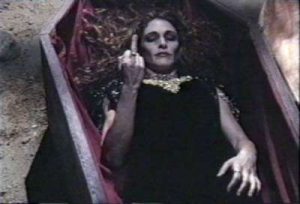
(Sorry-not-sorry for the image: I couldn’t NOT include it)
In this blog post I want to examine the very last text in Bram Stoker’s Dracula:
“We want no proofs; we ask none to believe us! This boy will some day know what a brave and gallant woman his mother is. Already he knows her sweetness and loving care; later he will understand how some men so loved her, that they did dare much for her sake” (402).
As I was reading this text for the second time in class, I recognized an interesting connection to be made between it and Carol Senf’s critique of the novel, “By the conclusion of the novel, all the characters who have been accused of expressing individual desire have been appropriately punished” (430). Senf’s perspective presents a completely different understanding of the “hero” plot we have understood so far.
Senf’s argument seems to follow the connections we have been making to Christianity, whereby there is some god-like figure who deals out justice to the characters who have committed sin. Dracula, his disciples, and even Mina suffer due to their connection to and involvement in the dark side, which completely undo’s the “men banding together to defeat the enemy” plot line of Dracula. It almost seems as if their actions did not really matter because the Count, as a beacon of evil, was meant to be punished anyways. The idea of free will is undermined and the destiny of Dracula’s defeat is made definitive.
This seems to play into the Victorian “era of fears”. The Victorians were worried that somehow their society could be attacked and contaminated regardless of the actions they might take to prevent it. The English empire would last because it was destined to; God himself looked highly upon the queen and her nation. Yet in Dracula we see a different answer; it is not who we are, nor where we are from, but our good or bad actions that will save or demolish us. Lucy dies along with Dracula, and it has naught to do with her being a woman, or being English, but with her attachment to sin.
I think more broadly this introduces the idea of what I will call the Mirage of Choice; grandly, our actions are inconsequential. God will decide to make things wright or wrong accordingly. The plot of the novel would suggest that men are capable of deciding for themselves these differences – Senf calls them self-proclaimed “agents of God” (430) – while Carol suggests that they are just the opposite, blips of flesh in a universe of God’s bidding.
I think Senf does not present a necessarily negative perspective on choice and justice, however. If we accept that the characters of the novel have free will, we are presented with a group of murderers and rapists. Allowing for destiny to have brought these men together and destroy the Count and his following sheds a more positive light on the events of the novel, at least from a Christian perspective. This is not to excuse responsibility in the novel; I don’t think Senf is making that argument here. I do believe that we cannot ignore the ideas of good versus evil in a religious context just because the novel may not explicitly say so.